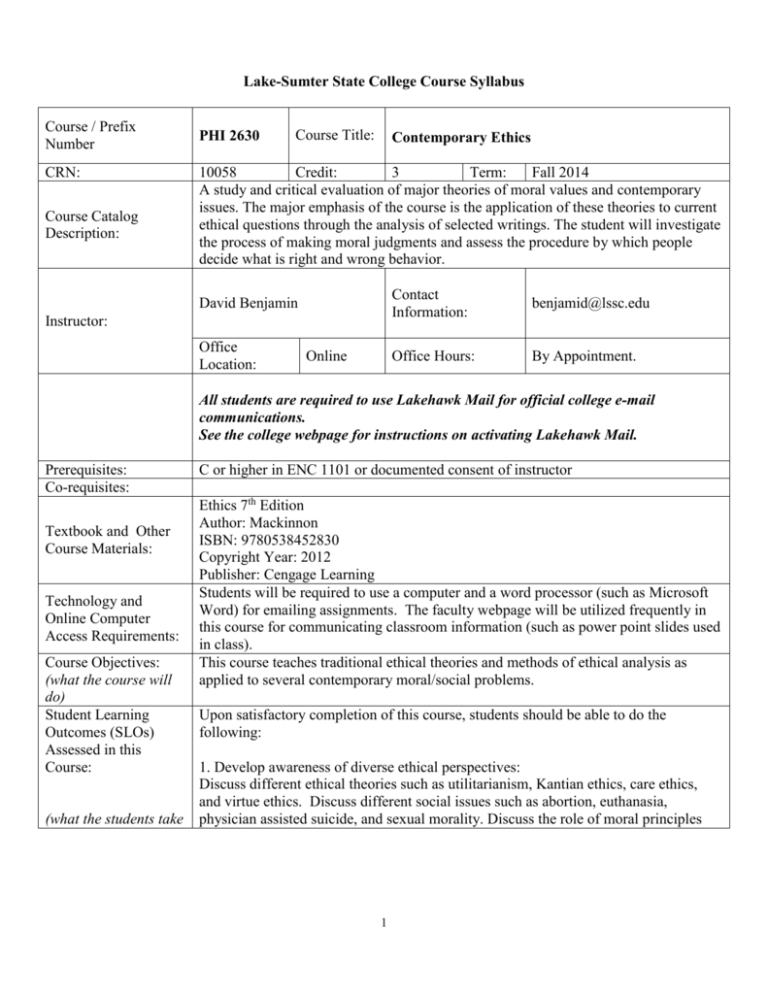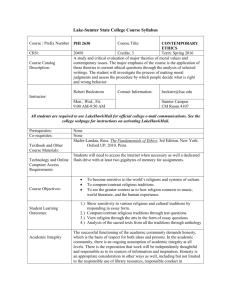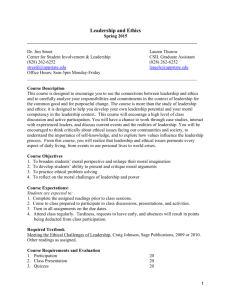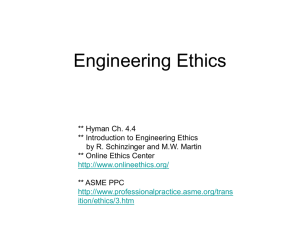Ethics Syllabus Fall 2014 - Lake
advertisement

Lake-Sumter State College Course Syllabus Course / Prefix Number CRN: Course Catalog Description: PHI 2630 Course Title: Contemporary Ethics 10058 Credit: 3 Term: Fall 2014 A study and critical evaluation of major theories of moral values and contemporary issues. The major emphasis of the course is the application of these theories to current ethical questions through the analysis of selected writings. The student will investigate the process of making moral judgments and assess the procedure by which people decide what is right and wrong behavior. David Benjamin Instructor: Office Location: Online Contact Information: benjamid@lssc.edu Office Hours: By Appointment. All students are required to use Lakehawk Mail for official college e-mail communications. See the college webpage for instructions on activating Lakehawk Mail. Prerequisites: Co-requisites: Textbook and Other Course Materials: Technology and Online Computer Access Requirements: Course Objectives: (what the course will do) Student Learning Outcomes (SLOs) Assessed in this Course: (what the students take C or higher in ENC 1101 or documented consent of instructor Ethics 7th Edition Author: Mackinnon ISBN: 9780538452830 Copyright Year: 2012 Publisher: Cengage Learning Students will be required to use a computer and a word processor (such as Microsoft Word) for emailing assignments. The faculty webpage will be utilized frequently in this course for communicating classroom information (such as power point slides used in class). This course teaches traditional ethical theories and methods of ethical analysis as applied to several contemporary moral/social problems. Upon satisfactory completion of this course, students should be able to do the following: 1. Develop awareness of diverse ethical perspectives: Discuss different ethical theories such as utilitarianism, Kantian ethics, care ethics, and virtue ethics. Discuss different social issues such as abortion, euthanasia, physician assisted suicide, and sexual morality. Discuss the role of moral principles 1 with them beyond this course) such as beneficence, non-maleficence, and justice in making moral judgments. 2. Apply critical thinking through problem solving: Discuss the nature and structure of moral reasoning as it applies to particular moral problems. Distinguish between moral positions that are backed by evidence and personal emotional reactions. Identify fallacies of moral reasoning such as the slippery slope and blind conformity. Use different ethical theories to help clarify a moral problem. In class--as part of class discussion or group activity--argue, analyze, critique, and/or debate a particular moral position. Write an essay analyzing a moral problem and/or defending a particular moral position. 3. Demonstrate tolerance for a wide range of global, social and cultural points of view: Discuss how different principles applied to the same moral issue can generate alternative ethical perspectives. Discuss the ways in which cultural and religious perspectives relate to ethical decision making. Demonstrate moral sensitivity to human welfare by identifying and discussing moral problems in ordinary life contexts. 4. Make use of technology to organize, acquire, and convey information: Use a computer, a basic computer operating system, and a word-processing program. Use an e-mail system to send and receive messages. Use the Internet to link to and download course information. Use the Internet to research and gather information to form enlightened ethical judgment. Academic Integrity: Important Information for Students with Disabilities: Privacy Policy (FERPA): The successful functioning of the academic community demands honesty, which is the basis of respect for both ideas and persons. In the academic community, there is an ongoing assumption of academic integrity at all levels. There is the expectation that work will be independently thoughtful and responsible as to its sources of information and inspiration. Honesty is an appropriate consideration in other ways as well, including but not limited to the responsible use of library resources, responsible conduct in examinations, and the responsible use of the Internet. (See college catalog for complete statement.) Any student with a documented disability who requires assistance or academic accommodations should contact the Office for Students with Disabilities immediately to discuss eligibility. The Office for Students with Disabilities (OSD) is located on the Leesburg Campus, but arrangements can be made to meet with a student on any campus. An appointment can be made by calling 352-365-3589 and specific information about the OSD and potential services can be found at www.lssc.edu, then go to “Quick Links” and click on Disability Services. The Family Educational Rights and Privacy Act (FERPA) (20 U.S.C. § 1232g; 34 CFR Part99) is a Federal law that protects the privacy of a student’s education records. In order for your information to be released, a form must be signed and in your records located in the Admissions/Registrar’s Office. 2 Attendance / Withdrawal Policies: Withdrawal Deadline: Consistent attendance is absolutely essential for this course. This, of course, will make available to students the opportunity of class participation, which will be onefifth of the final grade. Withdrawal will follow the LSSC/s policies. Wed 11/05/14 10% = Participation 15% = Weekly Quizzes 15% = Discussion Forum 30% = Midterm 30% = Final Exam Participation: 10% of final grade. I reserve the right to deduct a full letter grade from your final grade due to foul language and poor behavior in the discussion forums. Inappropriate language and behavior in the online classroom as well as face to face classroom will not be tolerated. Show respect to both your fellow classmates and your instructors in all of your courses at whatever college you attend. Your participation grade will also reflect your lateness on discussions and assignments. Methods of Evaluation: Weekly Quizzes: 15% of final grade (approx. 1% each). Students will take chapter quizzes online each week. The quizzes will have multiple choice and true/false questions. You have a maximum of 2 attempts per quiz. The 2nd attempt may only be taken if the 1st attempt is less than a passing grade of 60% AND you had technical difficulties while taking the 1st attempt. In this course, quizzes are only a means to test your knowledge of what you have already learned and are not a medium for learning. To learn, you need to study the PowerPoint lectures and read your text. After you complete your quiz, you will only see your score, you will not see the correct answers to each question since the quiz questions will be re-used on the exams though you will see the correct answers after completing the exams. Discussions: 15% of final grade (approx. 1% each). Students will receive points each week depending upon constructive and productive interaction in discussion forums. You are expected to post twice to each discussion. Post #1 is your original comment of 150 words that answers the discussion question due each Wednesday night by midnight. Post #2 is your 50 word reply to a classmate’s post that is due each Sunday night by midnight. Those who do not post any comments receive a grade of 0, only 1 comment will receive a grade of 5, and both comments will receive a grade of 6 to 10 depending upon the quality of the posts. EXAMS: 60% of final grade (30% each). Due to the large amount of material covered in the book for this class, there will be two fairly large open book exams which will consist primarily of multiple choice and true/false questions. Again, you only have 2 attempts for exams as with quizzes so make sure your internet connection is strong or else go to the college and use a free computer to complete them without technical difficulties. As with quizzes, you may only re-take an exam a 2nd time if your grade 3 is less than passing (<60%) and you have technical problems while completing the exam. If your computer fails during your first attempt, you should use a free computer on campus for your 2nd attempt to be safe since you will not have a 3rd attempt. IMPORTANT: Final grades will not be rounded up in this course. Whatever grade you end up with at the end of the course is your final grade regardless of how close it may be to the next grade. For example, a final grade of 89.9 is a B not an A. Also, grades are calculated by percentage NOT points. To calculate your final grade you will need to multiply the avg per grade category by the percentage listed above for that category. Since each category is weighted differently, simply adding up all of your points and dividing by the total possible will not produce your grade for this course. Grading Scale: Course Calendar: Classroom Rules and Policies: Violence Statement: Syllabus Disclaimer: A= 90 – 100, B = 80 – 89, C = 70-79, D = 60 – 69, F = 50 - 59 TBD Use only recognized, authoritative sources such as books, news magazines, official websites—however, absolutely no Wikipedia. Always use appropriate citations in your manuscript. Lake-Sumter State College has a policy of zero tolerance for violence as stated in College Board Rule 2.17. Appropriate disciplinary action will be taken in accordance with Board Rule 2.17. Information contained in this syllabus is, to the best knowledge of this instructor, considered correct and complete when distributed to the student. The instructor reserves the right, acting within policies and procedures of Lake-Sumter State College, to make necessary changes in course content or instructional techniques without prior notice or obligation to the student. 4








